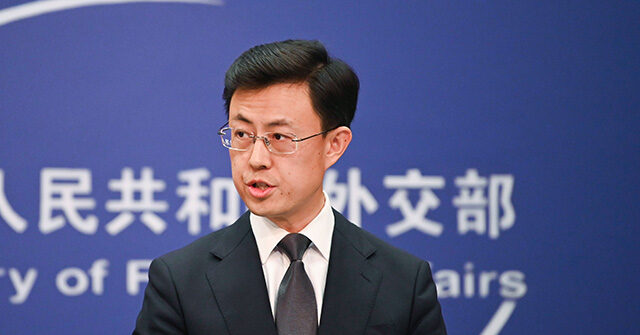The Chinese Foreign Ministry on Friday condemned France, Germany, and the United Kingdom for invoking the “snapback” provision of the Iran nuclear deal, beginning a 30-day countdown for United Nations sanctions to resume against Iran.
“The Iranian nuclear issue is at a crucial crossroads. Initiating the snapback process at the Security Council is not a constructive move, which will disrupt the settlement of the Iranian nuclear issue through political and diplomatic means,” said Chinese Foreign Ministry spokesman Guo Jiakun.
“China believes that current moves by the Security Council should contribute to resuming dialogue and negotiation rather than create new confrontation and lead to deterioration or even escalation of the situation,” he said.
Guo claimed China would “continue to uphold an objective and fair position, actively promote talks, and play a constructive role in bringing the issue back to the track of diplomatic settlement as early as possible.”
The “snapback” provision was written into the 2015 nuclear deal, formally known as the Joint Comprehensive Plan of Action (JCPOA), so that any of the signatories could initiate the process of restoring sanctions against Iran due to non-compliance.
France, Germany, and the UK – collectively known as the E3 – invoked the snapback provision on Thursday after spending two months trying to convince Iran to resume cooperation with the International Atomic Energy Agency (IAEA).
The IAEA censured Iran for not fully complying with its nuclear obligations in June. This was soon followed by Israeli and U.S. airstrikes against Iran’s uranium enrichment facilities. Iran halted all cooperation with the IAEA after those airstrikes. Some Iranian officials accused the IAEA of giving Israel and America information that helped them to target their attacks.
In mid-August, Iran seemingly relented and allowed IAEA officials back into the country, but they have not been allowed to perform meaningful inspections at any of Iran’s uranium enrichment sites. To date, the IAEA has only been allowed to visit Iran’s nuclear power plant at Bushehr.
IAEA Director-General Rafael Grossi expressed optimism that his inspectors would eventually be allowed to visit the three main Iranian sites hit by massive American bombardments in June, but the E3 said Tehran has run out of time to resume cooperation. The 30-day snapback countdown could be halted if Iran convinces the E3 it will resume compliance with inspections.
“I can say that it is important that the inspectors are back. At the same time, we still need to clarify a number of things, and we still need to address all the issues that are important in terms of the inspections that we have to carry out in Iran,” Grossi said in an interview on Wednesday.
The Iranians have refused to account for the large stockpile of near-weapons-grade uranium they refined before the U.S. strikes on their enrichment facilities. Grossi said this week that his agency has no reason to believe the uranium stockpile has been moved out of its storage facilities, which would suggest the uranium is currently buried under rubble.
At a closed-door meeting of the U.N. Security Council (UNSC) on Friday, the E3 urged Iran to meet three key demands to delay snapback sanctions by up to six months. The three demands are for Iran to restore full access to IAEA inspectors, provide full disclosure on the status of its uranium stockpile, and resume negotiations with the United States.
“Our asks were fair and realistic. However, as of today, Iran has shown no indication that it is serious about meeting them,” said Barbara Woodward, the UK ambassador to the United Nations.
A senior Iranian official responded that the E3 “needs to show Tehran that there is good faith,” and any decision about resuming talks with the U.S. would be made by the Supreme National Security Council in Tehran.
China and Russia inserted themselves into the high-stakes negotiations by proposing a UNSC resolution that would extend the JCPOA, currently scheduled to expire in its entirety in October, by six months. The initial version of their proposal would have blocked the E3 from invoking snapback sanctions, but China and Russia removed this language after objections from the other permanent members of the Security Council.


















